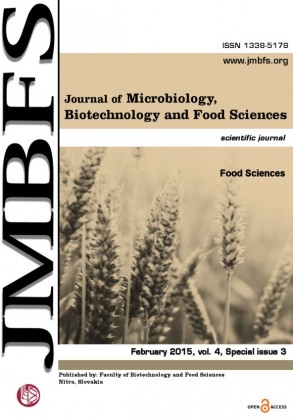EFFECT OF BEE POLLEN DIETARY SUPPLEMENTATION ON MEAT PERFORMANCE OF ROSS 308 BROILER CHICKENS
DOI:
https://doi.org/10.15414/jmbfs.2015.4.special3.55-58Keywords:
Meat performance, bee polen, Ross 308, broilerAbstract
A present study was conducted to evaluate the effect of dietary inclusion of bee pollen extract on meat performance of Ross 308 broiler chickens. A total of 180 one day-old Ross chicks were involved in experiment. Chickens were divided into 2 groups, an experimental group (E) and a control group (C). No added supplement was given to the control group, while the experimental group was given the feed mixture supplemented with bee pollen in an amount of 400 mg.kg-1, during the whole fattening period. Data of live body weight, carcass weight, giblets weight and carcass yield were determined at 42 days of the age. The supplementation of bee pollen increased final body weight of broilers by 68.5 g. Each of investigated parameters of meat performance in experimental group was higher to that in control group, although the difference among the groups was not statistically significant (P≥0.05). The addition of bee pollen at dose 400 mg.kg-1 in the feed mixture indicates the slight effect on meat performance of chickens which can be beneficial for fattening of broiler chickens.Downloads
Download data is not yet available.
Downloads
Published
2015-02-02
How to Cite
HaÅ¡ÄÃk, P., Trembecká, L., TkáÄová, J., KroÄko, M., ÄŒuboň, J., & KaÄániová, M. (2015). EFFECT OF BEE POLLEN DIETARY SUPPLEMENTATION ON MEAT PERFORMANCE OF ROSS 308 BROILER CHICKENS. Journal of Microbiology, Biotechnology and Food Sciences, 4(special issue 3 (Food Sciences), 55–58. https://doi.org/10.15414/jmbfs.2015.4.special3.55-58
Issue
Section
Food Sciences
License
Copyright (c) 2015 Peter HaÅ¡ÄÃk, Lenka Trembecká, Jana TkáÄová, Miroslav KroÄko, Juraj ÄŒuboň, Miroslava KaÄániová

This work is licensed under a Creative Commons Attribution 4.0 International License.
All papers published in the Journal of Microbiology, Biotechnology and Food Sciences are published under a CC-BY licence (CC-BY 4.0). Published materials can be shared (copy and redistribute the material in any medium or format) and adapted (remix, transform, and build upon the material for any purpose, even commercially) with specifying the author(s).





